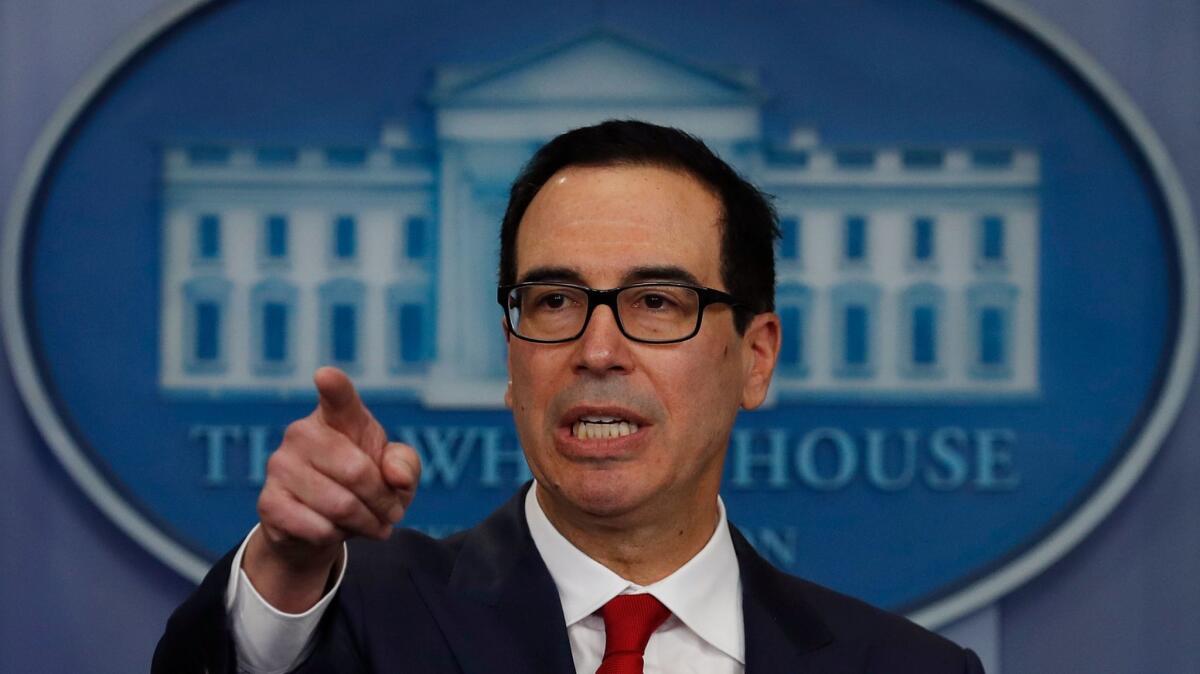Treasury report slams consumer bureau in latest salvo over arbitration rule

The Treasury Department on Monday issued a report critical of a pending federal rule that would limit the use of forced arbitration by financial firms, calling it flawed and a giveaway to class-action attorneys.
The report is the latest salvo in an ongoing fight over the regulation, opposed by the finance industry and many Republicans in Congress. The House of Representatives has already voted to scrap the rule, and the Senate has about a month to do the same before a key deadline.
The Consumer Financial Protection Bureau’s rule, finalized in July, allows banks to demand that customers submit to arbitration in individual disputes. But the rule prohibits private-arbitration agreements from including a ban on participation in class-action cases.
The Treasury report said that the bureau did not reasonably find that the ban would be in the public interest or benefit consumers. It also said the rule often runs counter to the findings of an arbitration study the bureau compiled in 2015.
That study, the report said, found that most consumers get little if any relief from class-action settlements and could get more in private arbitration even if most consumers don’t go that route.
The rule also has been criticized by Treasury official Keith Noreika, acting comptroller of the currency, who this summer asked the CFPB to delay implementing the new rule over concerns that it would threaten the health of the nation’s biggest banks.
Scott Pearson, a partner at law firm Ballard Spahr who represents financial services firms, said the report could be aimed at pushing the Senate to scrap the rule — or serve as a justification for terminating CFPB Director Richard Cordray, an Obama appointee.
Pearson said the report essentially argues that the CFPB ignored its responsibilities and mandate when it issued the rule.
“The study the CFPB did does not support the rule the CFPB issued,” he said. “They were going to interpret their study in a way that allowed them to do what they were going to do anyway. That’s not what they were supposed to do.”
Sen. Sherrod Brown (D-Ohio), who supports the arbitration rule, said the Treasury report “cherry-picked arguments” and that the CFPB’s 2015 arbitration study “demonstrates that hard-working Americans benefit when they get their day in court.”
The Treasury report does not provide findings counter to the CFPB’s, but rather says the bureau did not make a convincing case or show enough evidence that the rule would benefit consumers.
The report also said attorneys, not consumers, would stand to benefit most from the rule.
Citing the bureau’s own statistics, it said that the rule probably would lead to an increase in the number of class-action suits filed against banks and other financial firms. The rule “will transfer an additional $330 million over five years from affected businesses to the plaintiffs’ bar,” the report stated.
But backers of the CFPB counter that many consumers don’t want to go through the trouble of arbitration, especially over small matters, allowing financial firms to continue to charge improper fees and engage in other practices that, when multiplied by tens of thousands of consumers, amount to malfeasance.
Wells Fargo, for instance, successfully used its arbitration clause to block lawsuits filed by consumers who said the bank had created unauthorized accounts in their names. Had those cases been allowed to proceed, critics suggest, Wells Fargo’s accounts scandal may have been exposed years earlier.
More recently, Equifax has been held up as another example of why the arbitration rule is needed. After the credit bureau’s recent hack, it offered credit monitoring services to those affected, but customers had to sign an arbitration agreement to get that service — something Equifax later backtracked on.
Congress has until mid-November to scrap the rule or it will go into effect.
Follow me: @jrkoren
ALSO
Trump vows ‘no change’ to 401(k) rules in Republican tax bill
Ryan says tax overhaul will include a bracket aimed at the wealthy
NBC’s Megyn Kelly blasts Fox News and Bill O’Reilly over sexual harassment claims
Weinstein scandal puts nondisclosure agreements in the spotlight
UPDATES:
3:45 p.m.: This article was updated with more details about the controversy over banning class-action lawsuits from bank customers.
This article was originally published at 2:05 a.m.
More to Read
Inside the business of entertainment
The Wide Shot brings you news, analysis and insights on everything from streaming wars to production — and what it all means for the future.
You may occasionally receive promotional content from the Los Angeles Times.











